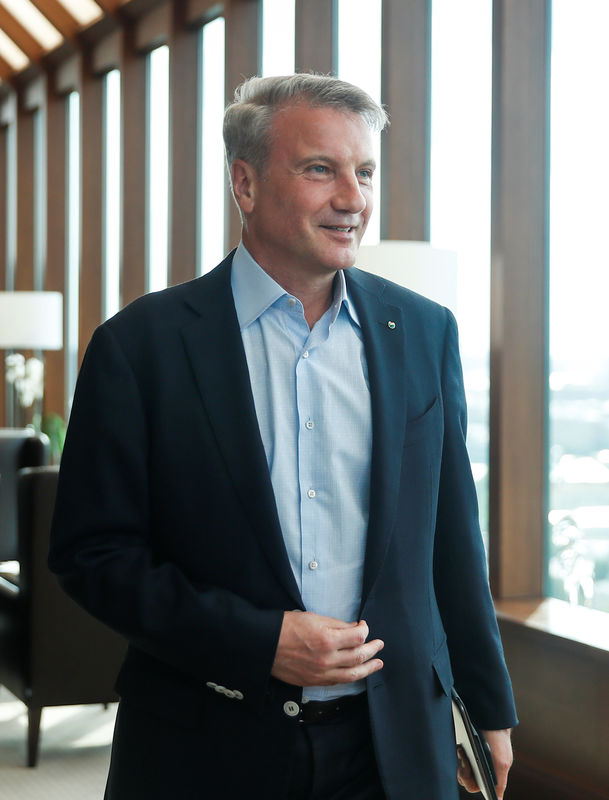By Tatiana Voronova, Darya Korsunskaya and Katya Golubkova
MOSCOW (Reuters) - German Gref, the head of Russia's biggest bank Sberbank, said a proposed law that could result in people being jailed for helping enforce U.S. sanctions would backfire on the Russian economy if implemented.
The draft legislation has exposed divisions within Russia's ruling elite over how to react to Washington's latest round of sanctions. Pro-Kremlin hawks want a tough response, while economic liberals, also allied to the Kremlin, say that could hurt the fragile economy.
In an interview with Reuters, Gref said criminalizing compliance with U.S. sanctions could force international firms to pull out of Russia.
"This law ... will hit all public companies very hard, not to mention the banking sector," said Gref. "It will be a problem for all foreign investors. I fear that, in a choice between coming under American sanctions or writing off their Russian investments, they will chose the second option."
Gref is a former economy minister and one of the leading advocates of liberal economic policies in Russia's ruling establishment.
The draft law, backed by Kremlin loyalists, has been approved at first reading in the State Duma, the lower house of parliament. A second reading has been put on hold pending consultation with business leaders.
President Vladimir Putin said last week lawmakers backing the legislation were guided by "emotional considerations" and that the response to U.S. sanctions should be balanced.
POLITICAL SOLUTION
Washington included Russian tycoons and their firms on a sanctions blacklist in April. It said it acted because they were profiting from their ties to a Kremlin carrying out "malign activities" around the world.
Russian firms and entities have been subject to Western sanctions since Moscow annexed Ukraine's Crimea in 2014. But the new measures cut deeper, especially sanctions against aluminum giant Rusal. Its sales ground to a halt, its supply chain was disrupted, and banks and trading platforms turned their backs.
In the interview with Reuters, Gref said there was little that Russian banks can do to mitigate the damage from sanctions.
"We were sanctioned not because of our actions or shareholder structure, but because that was how the geopolitical situation was," Gref said.
"In the case of the latest round of sanctions, it is obvious that the U.S. Treasury Department did not take into account all the consequences. Many refiners in Europe were left with no primary aluminum. Now the time is needed to find a solution which would comfort all. For the market this was a shock."
Gref is one of a group of influential people within the ruling camp who are pushing for structural reform of the economy. They favor a higher retirement age, a reduced role for the state in the economy, and investment in high-tech projects.
However, their ideas face resistance from other camps associated with the Kremlin, and no firm plan of action has yet emerged.
"I think there is a big appetite for reform and everyone would like to see systemic changes," said Gref.
"Our president has underlined the need for serious changes and has set up quite ambitious targets. The question is how to achieve them. In my opinion, this is impossible without reforming our institutions and socio-economic policies."

After being sworn in for a fourth term as president on May 7, Putin ordered the government to make the Russian economy one of the world's top five by 2024 and said he wanted to prioritize health, education and infrastructure spending.